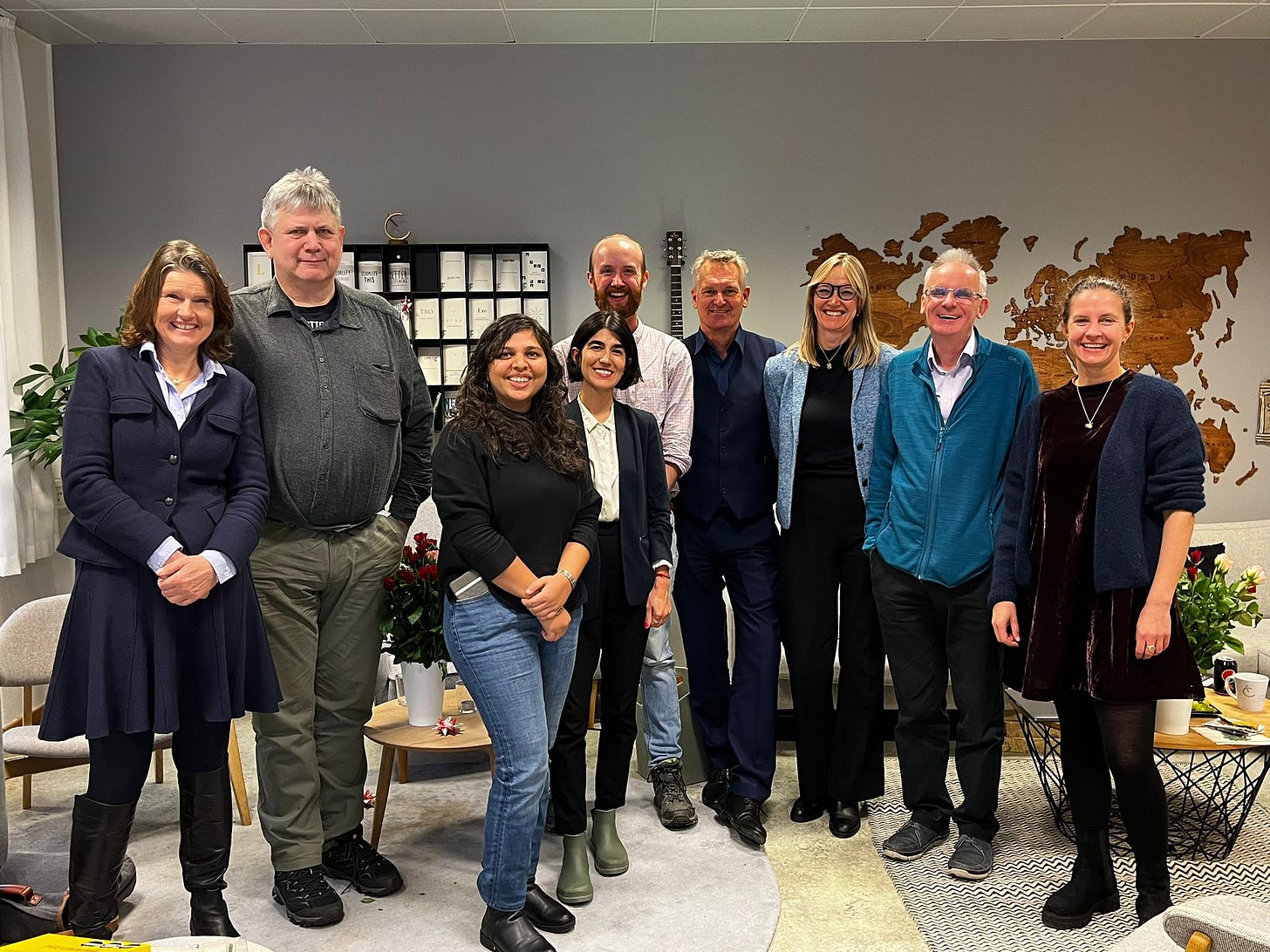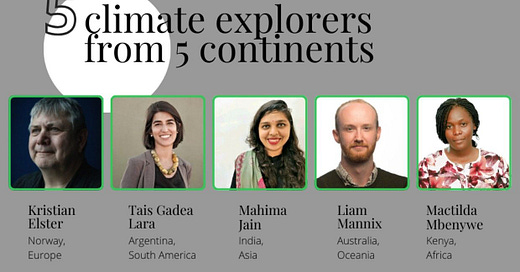New Beginnings: Journalism Adventures in Aarhus, Denmark
TK #8: What am I up to in 2024? Constructive climate journalism at the Constructive Institute.
TK, short for “To Come,” in publishing and journalism is used by editors to mark missing information in a draft. This newsletter is Mahima Jain’s repository of work to come: ideas and thoughts, reportage and stories, anecdotes and insights.
Once again, I couldn’t keep up my promise of a fortnightly cadence as my energies were consumed by a move to Denmark (more on that below). To make up for it, I will be sending out two newsletters this week: today (January 31) and tomorrow (February 1). In TK #9, tomorrow, I will focus on a question I’ve been asked a lot in the last month, about applications for grants and fellowships. So do stay tuned, and subscribe.
“I am thrilled to share that I will be a Climate Explorer at the Constructive Institute and Aarhus University in Denmark from January 2024 to June 2024.” This is the message I sent my friends, peers, mentors and relatives in late December and early this year. When I started writing this edition–earlier this month–I was more discombobulated than joyously thrilled.
A lot was going on behind the “thrilled” in that sentence: Floating through the motions of what a move must look like: make lists, pack clothes appropriate for Nordic weather, weigh suitcases, ziplock spices, clean up the flat, rent a new flat, phase out and stop old work, shop ‘stuff’, start thinking about new work, last-minute online orders for more ‘stuff’. Then there was the bureaucracy to battle: processes for visa applications and resident permits, scheduling flights, investigating why the visa was overdue, and rescheduling flights. Arrive at, settle in and drop the anchor in a new town for the next five months; purchase a new SIM card (it is not as simple as it sounds), IKEA-shop for new duvet covers at near-zero temperatures, get registered as a citizen, figure out how the library works. So please tell me, where is the time to be “thrilled”?
Now that this rant is done, let me get to the point of this edition of TK, a.k.a. the context for what I will be up to for the next six months. It is all about constructive journalism and the Constructive Institute.
What is constructive journalism?
The short answer is: Journalists are taught to ask and answer the questions of 5Ws and 1H–who, what, when, why, where, and how. Constructive journalism adds another one: what now?
The Constructive Institute says it combines the focus on solutions with coverage of nuance and democratic conversation. It is:
…a response to increasing sensationalism and negativity bias of the news media today. Its main mission is to reinstall trust in the idea that shared facts, shared knowledge and shared discussions are the pillars on which our communities balance – and it centres the democratic function of journalism as a feedback mechanism that helps society self-correct.
Why the Constructive Institute?
The Constructive Institute was started in 2017 by Ulrik Haagerup, a Danish journalist and editor, who was formerly an Executive Director of the Danish Broadcasting Corporation (DR, or as explained to outsiders in Denmark: “The BBC of Denmark”).
Unlike most journalists, Haagerup comes off as hopelessly optimistic. Some of that optimism may be rubbing off on me, as you will see. He is deeply passionate about journalism, a great listener, and a keen learner. I am currently reading Haagerup’s book Constructive News: How to save the media and democracy with journalism of tomorrow, and will share excerpts in the coming weeks.
At Constructive Institute, Haagerup and other Danish journalists have co-created a space for reflection and learning. The Institute offers a fellowship programme to journalists from Denmark, and sometimes from other Nordic or other European countries, an opportunity to think and reflect on various aspects of journalism. This has produced some interesting work, some of which you can see here.
So far the Institute has had over 80 fellows, who have gone back to their newsrooms and countries with the mission of infusing their respective beats and media organisations with constructive journalism.
For instance, one of the first cohorts launched the “Listen Louder” project, which explored the polarisation in public debates. The Explorers produced the “Listen Louder” booklet, which highlights more than a dozen examples from around the world of innovative ways in which journalists are trying to reduce polarisation, and recommends ways in which journalists can moderate political debates and engage the public.
Here’s Ewen MacAskill, former The Guardian journalist (famous for his stories and interviews with Edward Snowden) on how news media can be moderators of public debate:
This seems so pertinent for journalism in India, where polarisation seems to be at an all-time high.
What is the Climate Explorer programme?
There are two inter-connected problems with climate journalism: on the one hand, there’s too much focus on gloom-and-doom news, and on the other editors struggle to keep their focus on the biggest climate debates of our times.
As an antidote to the bad news, there’s been a lot of feel-good solutions journalism. But solutions are seldom universally applicable, and are often not based on evidence. There needs to be more investigations with nuance that offer a way forward, and also more engagement with the readers. But how?
The Constructive Institute, with the support of the Novo Nordisk Foundation, wishes to change this. The question we need to ask is, yes the world is warming. So what do we do now? How do we tell stories that don’t result in climate fatigue?
At Constructive Institute, I am joined by four other climate journalists from across the world to figure out how journalists and media organisations can tell better, constructive and engaging climate stories.

We are just a week into the programme but we’ve already met with over a dozen journalists, experts and decision-makers in the field. I’m quite excited that I will attend some classes at Aarhus University, attend lectures and seminars, and have conversations with some of the best minds working in climate and/or journalism. And finally, in June, we will share our project with the world at the Copenhagen WAN-IFRA conference. So stay tuned for details! Meanwhile, here’s more.
What’s the last 10 days in Denmark been like?
It’s like living in a utopian sci-fi world. Dedicated cycle lanes, walkable roads, garbage segregation, all garbage into waste incinerators that are connected to the city’s power and heating grid, no ticket checkers (they trust that commuters will have a ticket, but maybe there are random checks; we shall see), from mayors to cabbies – everyone seems to understand climate science and want to be sustainable and climate-conscious, and more.
I started watching a Danish show on Netflix called Borgen–[spoilers] in the opening episode, a Danish prime minister loses an election because he used a government-issued credit card to purchase luxury products worth $12,000 for his wife. He was planning to repay, but the receipts were leaked before he could do that.
I almost found the whole plot point unbelievable. Seriously, could this be a scandal? The corruption in India makes that sum look like a joke. But this could very much be a scandal in Denmark. In a recent ranking of corruption in different countries, Denmark is the most corruption-free. [end spoilers]
Yes, Denmark is smaller and has fewer socio-economic problems than India. It’s an apples-to-oranges comparison. For instance, Bangalore, the city I live in, has a population of 8-15 million. Aarhus, where I am now and the second largest city in Denmark, is just over 300,000. So creating wetlands for better groundwater recharge and clean energy is more ‘easily’ achievable.
But if we aspire to be more like the Western countries in our consumerism, surely there are lessons to learn in governance, journalism and other fields?
PS:
– Byline last month: Big tech ‘failing’ to curb fake news in global South, Sci-Dev.Net is my cross-border collaboration with Nigerian investigative journalist Jennifer Ugwa.
– Tomorrow, in TK #9, I answer some FAQs I received concerning grant applications. So…
Best,
Mahima Jain




